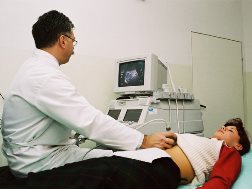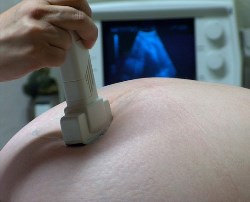How to Enroll in the Right Ultrasound Technician Degree Program near Deepwater Missouri
 Since you have made a decision to obtain an ultrasound technician degree near Deepwater MO, the next step is to start the process of picking a college. To begin with, you have to find the right program that will furnish the appropriate training to become a skilled professional. And because a number of states do require that ultrasound techs be either certified or licensed, depending on your residence you may also need preparation to pass a licensing or certification exam. So it’s extremely important that you research each college so that you can evaluate and compare your alternatives. But exactly where does one begin? Many students will begin by looking for colleges that are within travelling distance of their residences and then by comparing tuition. Certainly location and cost need to be considered when making a decision, but there are other critical factors also. For instance, if the ultrasound technician schools have earned accreditation or if they sponsor internships. These and other qualifiers will be discussed more in depth later in this article. But to start with, let’s go over what a sonogram tech does and the credentials and online training programs that are available.
Since you have made a decision to obtain an ultrasound technician degree near Deepwater MO, the next step is to start the process of picking a college. To begin with, you have to find the right program that will furnish the appropriate training to become a skilled professional. And because a number of states do require that ultrasound techs be either certified or licensed, depending on your residence you may also need preparation to pass a licensing or certification exam. So it’s extremely important that you research each college so that you can evaluate and compare your alternatives. But exactly where does one begin? Many students will begin by looking for colleges that are within travelling distance of their residences and then by comparing tuition. Certainly location and cost need to be considered when making a decision, but there are other critical factors also. For instance, if the ultrasound technician schools have earned accreditation or if they sponsor internships. These and other qualifiers will be discussed more in depth later in this article. But to start with, let’s go over what a sonogram tech does and the credentials and online training programs that are available.
Sonographer Job Description
 There are more than one acceptable titles for ultrasound techs (technicians). They are also referred to as sonogram techs, diagnostic medical sonographers (or just sonographers) and ultrasound technologists. Regardless of name, they all have the same primary job description, which is to perform diagnostic ultrasound procedures on patients. Although a number of techs work as generalists there are specializations within the profession, for example in pediatrics and cardiology. Most practice in Deepwater MO clinics, hospitals, outpatient diagnostic imaging centers and even private practices. Typical daily work functions of an ultrasound technician may involve:
There are more than one acceptable titles for ultrasound techs (technicians). They are also referred to as sonogram techs, diagnostic medical sonographers (or just sonographers) and ultrasound technologists. Regardless of name, they all have the same primary job description, which is to perform diagnostic ultrasound procedures on patients. Although a number of techs work as generalists there are specializations within the profession, for example in pediatrics and cardiology. Most practice in Deepwater MO clinics, hospitals, outpatient diagnostic imaging centers and even private practices. Typical daily work functions of an ultrasound technician may involve:
- Maintaining records of patient case histories and specifics of each procedure
- Counseling patients by explaining the procedures and answering questions
- Preparing the ultrasound machines for usage and then cleaning and re-calibrating them
- Escorting patients to treatment rooms and making them comfortable
- Utilizing equipment while minimizing patient exposure to sound waves
- Evaluating results and identifying necessity for further testing
Ultrasound techs must frequently gauge the performance and safety of their equipment. They also must adhere to a high professional standard and code of conduct as health practitioners. So as to maintain that level of professionalism and stay current with medical knowledge, they are required to enroll in continuing education courses on an ongoing basis.
Ultrasound Tech Degrees Offered
 Ultrasound technician students have the opportunity to earn either an Associate or a Bachelor’s Degree. An Associate Degree will generally involve about 18 months to 2 years to finish depending on the course load and program. A Bachelor’s Degree will take longer at as long as 4 years to finalize. Another option for individuals who have previously received a college degree is a post graduate certificate program. If you have earned a Bachelor’s Degree in any major or an Associate Degree in a relevant health sector, you can enroll in a certificate program that will take just 12 to 18 months to finish. Something to bear in mind is that the majority of sonographer colleges do have a practical training element as a portion of their curriculum. It often may be satisfied by participating in an internship program which many schools sponsor with Deepwater MO hospitals and clinics. After you have graduated from any of the certificate or degree programs, you will then need to fulfill the certification or licensing prerequisites in Missouri or whichever state you elect to practice in.
Ultrasound technician students have the opportunity to earn either an Associate or a Bachelor’s Degree. An Associate Degree will generally involve about 18 months to 2 years to finish depending on the course load and program. A Bachelor’s Degree will take longer at as long as 4 years to finalize. Another option for individuals who have previously received a college degree is a post graduate certificate program. If you have earned a Bachelor’s Degree in any major or an Associate Degree in a relevant health sector, you can enroll in a certificate program that will take just 12 to 18 months to finish. Something to bear in mind is that the majority of sonographer colleges do have a practical training element as a portion of their curriculum. It often may be satisfied by participating in an internship program which many schools sponsor with Deepwater MO hospitals and clinics. After you have graduated from any of the certificate or degree programs, you will then need to fulfill the certification or licensing prerequisites in Missouri or whichever state you elect to practice in.
Ultrasound Tech Online Programs
 As earlier discussed, virtually all ultrasound technician colleges have a clinical requirement to their programs. So while you can obtain a certificate or degree online, a significant part of the training will be either carried out in an on-campus lab or at a sponsored off campus facility. Practical training can often be fulfilled by means of an internship at a local Deepwater MO hospital, outpatient clinic or private practice. But the balance of the classes and training can be attended online in your Deepwater home. This is especially beneficial for those individuals that keep working while obtaining their degrees. In addition online programs are many times more affordable than traditional alternatives. Expenses for commuting and study materials can be decreased as well. But similarly as with any sonographer college you are reviewing, confirm that the online program you enroll in is accredited. Among the most highly regarded accrediting agencies is the Commission on Accreditation of Allied Health Education Programs (CAAHEP). Accreditation is particularly significant for certification, licensing and job placement (more on accreditation later). So if you are motivated enough to learn away from the classroom in the convenience of your own home, then an online school could be the right option for you.
As earlier discussed, virtually all ultrasound technician colleges have a clinical requirement to their programs. So while you can obtain a certificate or degree online, a significant part of the training will be either carried out in an on-campus lab or at a sponsored off campus facility. Practical training can often be fulfilled by means of an internship at a local Deepwater MO hospital, outpatient clinic or private practice. But the balance of the classes and training can be attended online in your Deepwater home. This is especially beneficial for those individuals that keep working while obtaining their degrees. In addition online programs are many times more affordable than traditional alternatives. Expenses for commuting and study materials can be decreased as well. But similarly as with any sonographer college you are reviewing, confirm that the online program you enroll in is accredited. Among the most highly regarded accrediting agencies is the Commission on Accreditation of Allied Health Education Programs (CAAHEP). Accreditation is particularly significant for certification, licensing and job placement (more on accreditation later). So if you are motivated enough to learn away from the classroom in the convenience of your own home, then an online school could be the right option for you.
Points to Ask Sonography Colleges
 As soon as you have decided on which degree or certificate that you would like to earn, you can start the process of assessing and comparing sonogram tech colleges. You may first want to choose whether you would rather attend classes online or travel to a college campus in the Deepwater MO area. Clearly location will be important if you choose the latter, and the price of tuition undoubtedly will be an initial qualification also. But there are other things that you should also take into account, for example if the colleges are accredited and if they offer internship programs. Therefore in order to perform your due diligence so that you can arrive at your ultimate selection, below are several questions that you need ask each sonographer college prior to making a decision.
As soon as you have decided on which degree or certificate that you would like to earn, you can start the process of assessing and comparing sonogram tech colleges. You may first want to choose whether you would rather attend classes online or travel to a college campus in the Deepwater MO area. Clearly location will be important if you choose the latter, and the price of tuition undoubtedly will be an initial qualification also. But there are other things that you should also take into account, for example if the colleges are accredited and if they offer internship programs. Therefore in order to perform your due diligence so that you can arrive at your ultimate selection, below are several questions that you need ask each sonographer college prior to making a decision.
Are the Ultrasound Technician Colleges Accredited? Most sonogram technician schools have obtained some type of accreditation, whether national or regional. However, it’s still imperative to confirm that the program and school are accredited. One of the most highly respected accrediting agencies in the field of sonography is the Joint Review Committee on Education in Diagnostic Medical Sonography (JRC-DMS). Programs receiving accreditation from the JRC-DMS have undergone a detailed review of their teachers and educational materials. If the school is online it may also obtain accreditation from the Distance Education and Training Council, which targets online or distance education. All accrediting agencies should be recognized by the U.S. Department of Education or the Council on Higher Education Accreditation. Along with ensuring a quality education, accreditation will also help in getting financial assistance and student loans, which are many times not accessible for non-accredited colleges. Accreditation can also be a pre-requisite for certification and licensing as required. And many Deepwater MO employers will only hire graduates of an accredited program for entry level jobs.
Are Internships Sponsored? Inquire if the ultrasound technician schools you are interested in have relationships with Deepwater MO clinics or hospitals for internship programs. Internships are not only an excellent means to obtain practical experience in a clinical setting, they are additionally a means to fulfill the clinical training requirement for most programs. As a secondary benefit, they can assist graduates and students establish professional connections in the Deepwater health care community and help with job placement.
Is Job Placement Assistance provided? You will most likely want to secure employment quickly after graduating, but getting that first job in a new profession can be difficult without help. Ask if the ultrasound tech schools you are considering have job placement programs and what their success rates are. Rapid and high placement rates are a good sign that the schools have substantial networks and good relationships with Missouri healthcare employers. It also corroborates that their graduates are well regarded and in demand.
Where is the Program Located? For many students, the school they choose will have to be within commuting distance of their Deepwater MO home. Students who have decided to attend online classes naturally will not have to concern themselves with the location of the campus. However, the availability of area internships will be of importance. One thing to consider is that if you decide to enroll in a college that is out of state or even out of your local area, you might be required to pay a higher tuition. State colleges generally charge higher tuitions for out of state residents. And community colleges frequently charge a higher tuition for those students that live outside of their districts.
How Large are the Classes ? Unless you are the sort of person that prefers to sit far in the rear of the classroom or get lost in the crowd, you will likely prefer a smaller class size. Smaller classes permit more individual participation and personalized instruction. Ask the colleges you are looking at what the typical student to teacher ratio is for their classrooms. If practical you may want to monitor one or more classes before making your ultimate determination. This will also give you an opportunity to converse with several of the instructors and students to get their opinions regarding the sonogram tech program also.
Can the School Accommodate your Schedule? And finally you must confirm that the ultrasound tech college you ultimately choose can provide the class schedule you need. This is especially important if you choose to continue working while you attend classes. If you must schedule night or weekend classes in the Deepwater MO area, confirm that they are offered. If you can only attend part-time, check if that is an alternative and how many credit hours or courses you would need to enroll in. Also, learn what the protocol is for making up any classes that you might miss because of illness, work or family obligations.
Enrolling in an Ultrasound Tech Program near Deepwater MO?
If you are considering a Sonography Tech School near Deepwater Missouri, following is some interesting background information about the location of your new school campus.
Deepwater, Missouri
Deepwater is located at 38°15′37″N 93°46′31″W / 38.26028°N 93.77528°W / 38.26028; -93.77528Coordinates: 38°15′37″N 93°46′31″W / 38.26028°N 93.77528°W / 38.26028; -93.77528.[8]
As of the census[2] of 2010, there were 433 people, 188 households, and 125 families residing in the city. The population density was 509.4 inhabitants per square mile (196.7/km2). There were 240 housing units at an average density of 282.4 per square mile (109.0/km2). The racial makeup of the city was 98.8% White, 0.5% Native American, and 0.7% from two or more races. Hispanic or Latino of any race were 1.6% of the population.
There were 188 households of which 25.0% had children under the age of 18 living with them, 42.0% were married couples living together, 17.6% had a female householder with no husband present, 6.9% had a male householder with no wife present, and 33.5% were non-families. 25.0% of all households were made up of individuals and 11.7% had someone living alone who was 65 years of age or older. The average household size was 2.30 and the average family size was 2.70.
The median age in the city was 45.1 years. 18% of residents were under the age of 18; 7.8% were between the ages of 18 and 24; 24% were from 25 to 44; 29.1% were from 45 to 64; and 21% were 65 years of age or older. The gender makeup of the city was 49.0% male and 51.0% female.
Find the Right Ultrasound Technician College Degree Deepwater MO
Enrolling in the ideal sonographer certificate or degree program is a vital first step to initiating a fulfilling new career providing diagnostic services to patients. Ultrasound tech schools require that you have earned a high school diploma or equivalent. In addition to satisfying academic standards, you need to be in at least reasonably good physical health, capable of standing for lengthy time frames and able to regularly lift weights of fifty pounds or more, as is it typically necessary to position patients and move heavy machines. Other helpful talents include technical proficiency, the ability to stay collected when faced with an anxious or angry patient and the ability to communicate clearly and compassionately. You originally came to this website due to an interest in Ultrasound Technician College Degree. However, as we have discussed in this article, there are multiple questions that you should ask each program you are looking at. This is true whether you select an online program or commute to the school campus to attend classes. And by asking the appropriate questions so that you can evaluate each program, you will be able to narrow down your options until you are left with the ideal program for your education. And with the right training, discipline and motivation to succeed, you can realize your objective to work as an sonographer in Deepwater MO.
Other Ultrasound Locations in Missouri
